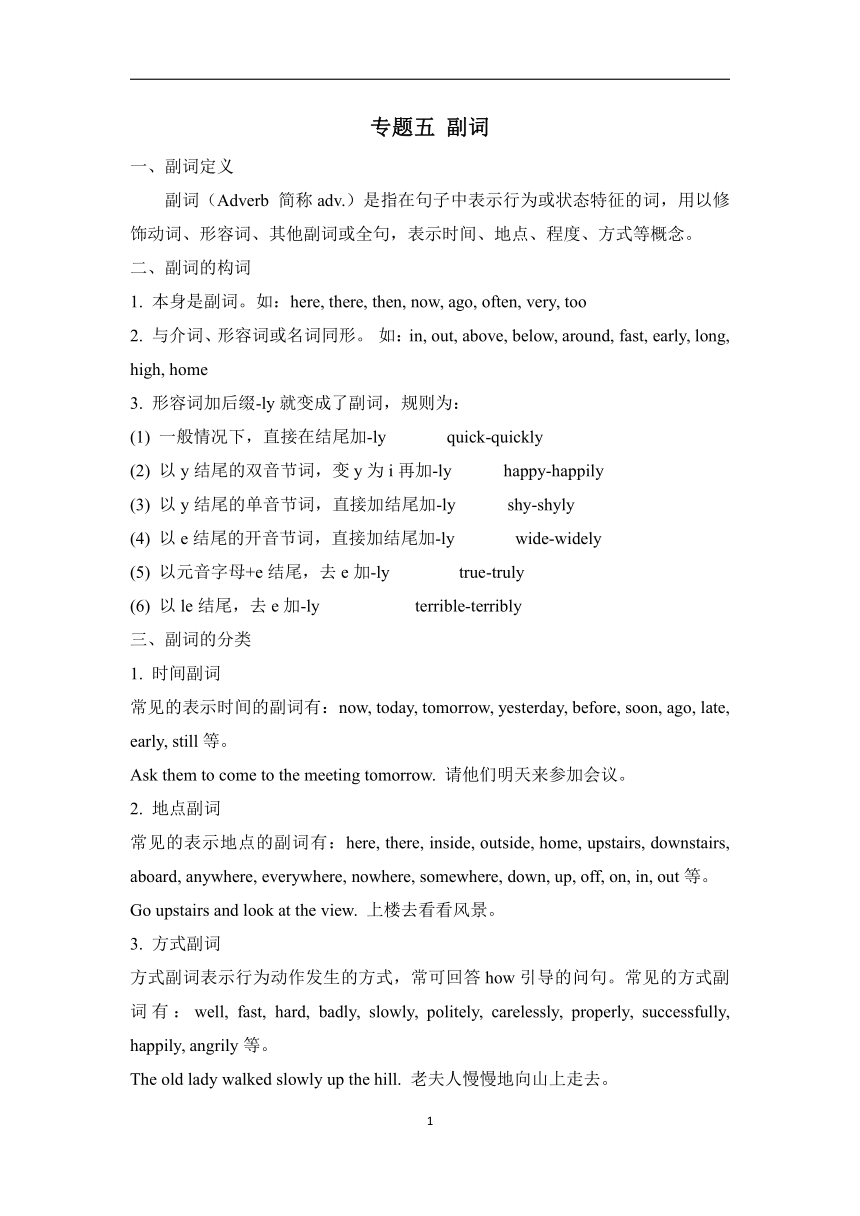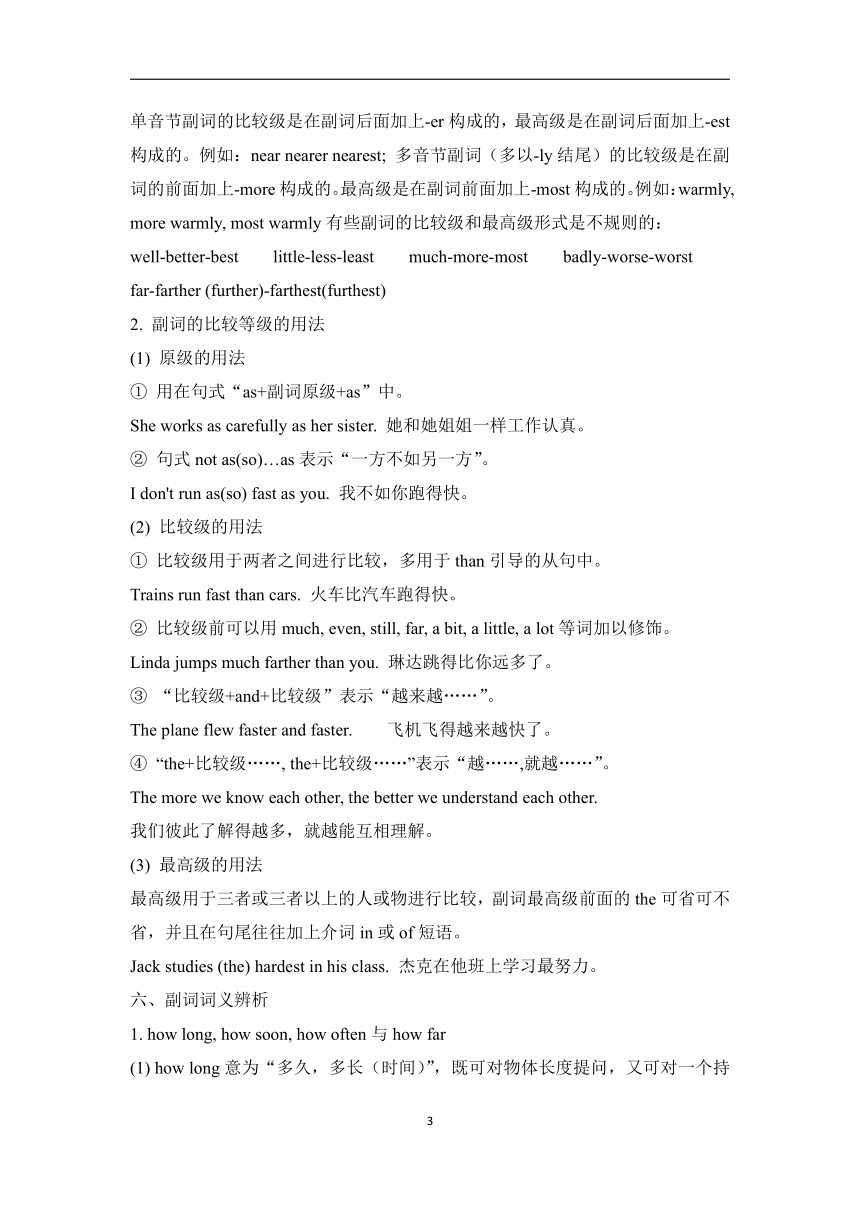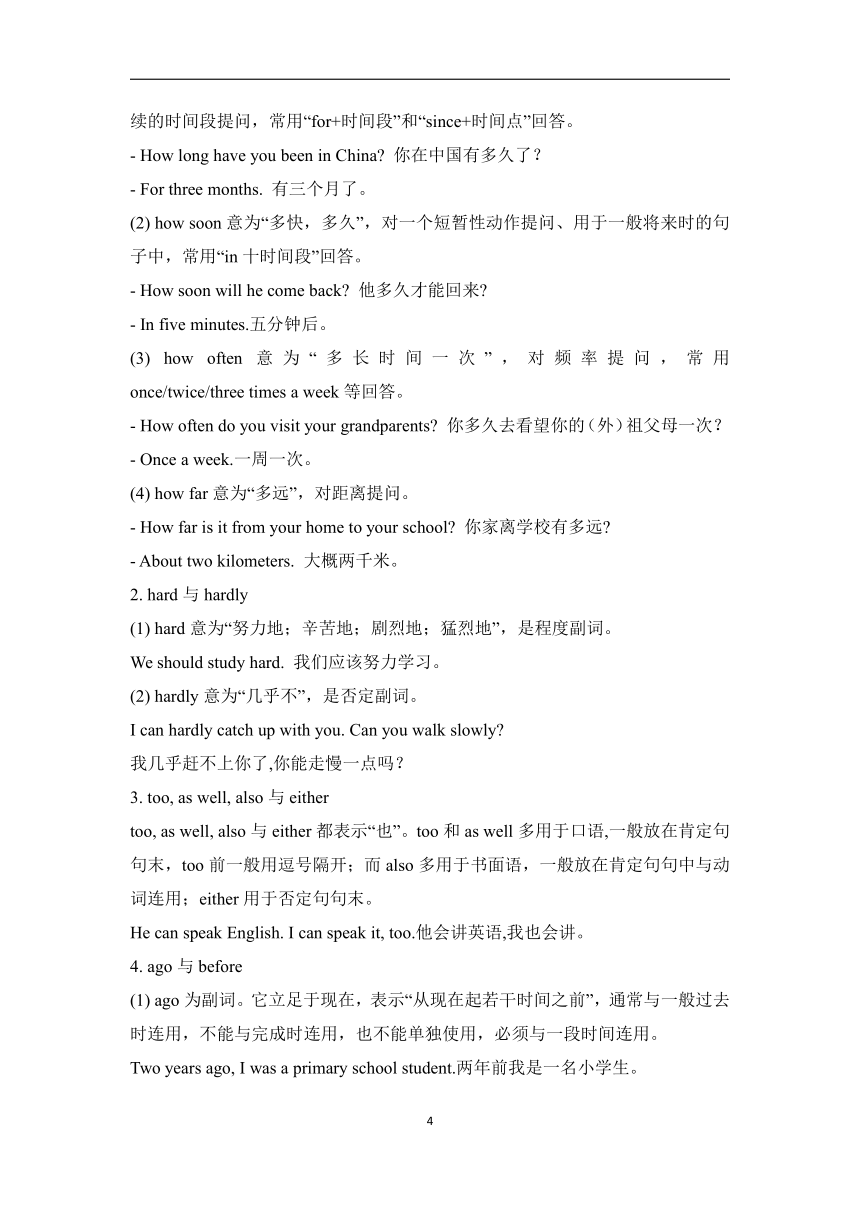专题五 副词——2024届中考英语一轮复习进阶讲义(学案)【人教版】
文档属性
| 名称 | 专题五 副词——2024届中考英语一轮复习进阶讲义(学案)【人教版】 |

|
|
| 格式 | docx | ||
| 文件大小 | 30.7KB | ||
| 资源类型 | 教案 | ||
| 版本资源 | 人教新目标(Go for it)版 | ||
| 科目 | 英语 | ||
| 更新时间 | 2023-12-14 08:16:54 | ||
图片预览




文档简介
专题五 副词
一、副词定义
副词(Adverb 简称adv.)是指在句子中表示行为或状态特征的词,用以修饰动词、形容词、其他副词或全句,表示时间、地点、程度、方式等概念。
二、副词的构词
1. 本身是副词。如:here, there, then, now, ago, often, very, too
2. 与介词、形容词或名词同形。 如:in, out, above, below, around, fast, early, long, high, home
3. 形容词加后缀-ly就变成了副词,规则为:
(1) 一般情况下,直接在结尾加-ly quick-quickly
(2) 以y结尾的双音节词,变y为i再加-ly happy-happily
(3) 以y结尾的单音节词,直接加结尾加-ly shy-shyly
(4) 以e结尾的开音节词,直接加结尾加-ly wide-widely
(5) 以元音字母+e结尾,去e加-ly true-truly
(6) 以le结尾,去e加-ly terrible-terribly
三、副词的分类
1. 时间副词
常见的表示时间的副词有:now, today, tomorrow, yesterday, before, soon, ago, late, early, still等。
Ask them to come to the meeting tomorrow. 请他们明天来参加会议。
2. 地点副词
常见的表示地点的副词有:here, there, inside, outside, home, upstairs, downstairs, aboard, anywhere, everywhere, nowhere, somewhere, down, up, off, on, in, out等。
Go upstairs and look at the view. 上楼去看看风景。
3. 方式副词
方式副词表示行为动作发生的方式,常可回答how引导的问句。常见的方式副词有:well, fast, hard, badly, slowly, politely, carelessly, properly, successfully, happily, angrily等。
The old lady walked slowly up the hill. 老夫人慢慢地向山上走去。
4. 程度副词
程度副词多用来修饰形容词和副词,有少数用来修饰动词或介词短语。常见的程度副词有:much, (a) little, a bit, very, so, too, enough, quite, rather, pretty, greatly, completely, nearly, almost, deeply, hardly等。
Your work is pretty good, but you could be better.
你的工作做得很不错,但是还可以更好些。
5. 频度副词
常用的频度副词有:always, often, usually, sometimes, seldom, ever, never等。
We sometimes visit our grandmother. 我们有时去看望我们的祖母。
6. 疑问副词
疑问副词是用来引导特殊疑问句的副词。常见的疑问副词有:how, when, where, why等。
How are you getting along with your studies 你的学习进展怎么样?
7. 关系副词
关系副词有:how, when, why, where等,他们的词形都和疑问副词一样,但都引导从句或与不定式连用。
Thomas wants to know where Nina lives. 托马斯想知道妮娜住在哪里。
四、副词的语法作用
1. 作状语,用来修饰动词、形容词、其他副词或句子。
I read very slowly. 我读的很慢。
2. 作表语,表示方位上的变化。
I'm out. 我在外面。
3. 作宾语补足语。
Let him in, please. 请让他进来。
4. 表示程度的副词一般放在被修饰词前,而enough则放在它所修饰的词后。
He is strong enough to carry the heavy box. 他有足够的力气搬这个重箱子。
五、副词的比较等级
1. 副词的比较等级的构成
副词和形容词一样,也有它的比较级和最高级形式,并且变化规则也是一样的。
单音节副词的比较级是在副词后面加上-er构成的,最高级是在副词后面加上-est构成的。例如:near nearer nearest; 多音节副词(多以-ly结尾)的比较级是在副词的前面加上-more构成的。最高级是在副词前面加上-most构成的。例如:warmly, more warmly, most warmly有些副词的比较级和最高级形式是不规则的:
well-better-best little-less-least much-more-most badly-worse-worst
far-farther (further)-farthest(furthest)
2. 副词的比较等级的用法
(1) 原级的用法
① 用在句式“as+副词原级+as”中。
She works as carefully as her sister. 她和她姐姐一样工作认真。
② 句式not as(so)…as表示“一方不如另一方”。
I don't run as(so) fast as you. 我不如你跑得快。
(2) 比较级的用法
① 比较级用于两者之间进行比较,多用于than引导的从句中。
Trains run fast than cars. 火车比汽车跑得快。
② 比较级前可以用much, even, still, far, a bit, a little, a lot等词加以修饰。
Linda jumps much farther than you. 琳达跳得比你远多了。
③ “比较级+and+比较级”表示“越来越……”。
The plane flew faster and faster. 飞机飞得越来越快了。
④ “the+比较级……, the+比较级……”表示“越……,就越……”。
The more we know each other, the better we understand each other.
我们彼此了解得越多,就越能互相理解。
(3) 最高级的用法
最高级用于三者或三者以上的人或物进行比较,副词最高级前面的the可省可不省,并且在句尾往往加上介词in或of短语。
Jack studies (the) hardest in his class. 杰克在他班上学习最努力。
六、副词词义辨析
1. how long, how soon, how often与how far
(1) how long意为“多久,多长(时间)”,既可对物体长度提问,又可对一个持续的时间段提问,常用“for+时间段”和“since+时间点”回答。
- How long have you been in China 你在中国有多久了?
- For three months. 有三个月了。
(2) how soon意为“多快,多久”,对一个短暂性动作提问、用于一般将来时的句子中,常用“in十时间段”回答。
- How soon will he come back 他多久才能回来
- In five minutes.五分钟后。
(3) how often意为“多长时间一次”,对频率提问,常用once/twice/three times a week等回答。
- How often do you visit your grandparents 你多久去看望你的(外)祖父母一次?
- Once a week.一周一次。
(4) how far 意为“多远”,对距离提问。
- How far is it from your home to your school 你家离学校有多远
- About two kilometers. 大概两千米。
2. hard 与hardly
(1) hard意为“努力地;辛苦地;剧烈地;猛烈地”,是程度副词。
We should study hard. 我们应该努力学习。
(2) hardly意为“几乎不”,是否定副词。
I can hardly catch up with you. Can you walk slowly
我几乎赶不上你了,你能走慢一点吗?
3. too, as well, also 与either
too, as well, also与either都表示“也”。too和as well多用于口语,一般放在肯定句句末,too前一般用逗号隔开;而also多用于书面语,一般放在肯定句句中与动词连用;either 用于否定句句末。
He can speak English. I can speak it, too.他会讲英语,我也会讲。
4. ago 与 before
(1) ago为副词。它立足于现在,表示“从现在起若干时间之前”,通常与一般过去时连用,不能与完成时连用,也不能单独使用,必须与一段时间连用。
Two years ago, I was a primary school student.两年前我是一名小学生。
(2) before可作副词,单独用,可以用于现在完成时。作连词时,可以引导一个过去时的从句,主句用过去完成时,表示在过去某个动作之前就已经完成的动作。
Has she visited China before 以前她访问过中国吗
5. too much, too many与much too
(1) too much意为“太多”,用作形容词词组,修饰不可数名词;
(2) too many意为“太多”,修饰可数名词复数;
(3) much too 意为“太,非常”,用作副词词组,修饰形容词,副词。
Too much snow can cause trouble. 雪太多会引起麻烦。
6. already与yet
(1) already 一般用于肯定句,常与完成时连用;有时也可用于疑问句中,表示惊奇。
Japanese companies have already made robots walk and dance.
日本公司已经制造出能走路和跳舞的机器人了。
(2) yet意为“已经,还,尚”,一般用于否定句和疑问句中,常位于主要动词前或句末。
But I haven't locked the garage yet. 但我还没有锁车库。
典例剖析
1.【2023年辽宁抚顺】If you want to borrow books from the school library, ______ forget your ID card.
A.always B.never C.sometimes D.hardly
2.【2022年辽宁丹东】— Why do you hardly make mistakes
— Because I do everything very _______.
A.carelessly B.unluckily C.carefully D.comfortably
3.【2021年湖南益阳】—Does your brother play computer games
—No, he ________ plays them. He always reads books.
A.sometimes B.often C.never
4.【2022年辽宁沈阳】People should ________ pick up the rubbish whenever they see it.
A.never B.seldom C.sometimes D.always
5.【2022年广西梧州】—Look out! There is a cat on the road.
—Don’t worry. I always drive very ________.
A.suddenly B.quickly C.carefully D.quietly
6.【2020年山东滨州】—Bill, I planned to give you the card on Saturday, but I ________ forgot.
—That’s OK. I won’t use it until next weekend.
A.completely B.recently C.quietly D.clearly
7.【2023年黑龙江牡丹江】Nancy was ________ told to meet her grandpa so she left in a hurry without saying goodbye to her friends.
A.slowly B.politely C.suddenly
8.【2023年广西河池】You’d better get up ________, or you will miss the train.
A.early B.slowly C.quietly D.carefully
9.【2022年辽宁营口】In the war against COVID-19, the Chinese government is making great efforts to make sure the vaccine (疫苗】is ________ taken through out the country.
A.hardly B.deeply C.widely D.simply
10.【2023年江苏镇江】Chinese women’s football team members worked _____ and won the Asian Cup.
A.widely B.closely C.hardly D.simply
11【2019年江西】I didn't do very well in this exam. Unluckily, he did it ________.
A. worse B. badly C. better D. worst
12【2021年济宁】In order to pass the exam, you need to work much ________ now.
A. hard B. harder C. hardest D. hardly
13【2022年攀枝花】—Which season do you like ________ in Panzhihua, dry season or rainy season
—Rainy season.
A. well B. better C. best D. the best
14【2023年咸宁】—Sarah is chosen as the guide for the Fashion Show.
—Great! No one speaks English ________ her.
A. as beautiful as B. as badly as
C. worse than D. better than15.【2021年内蒙古包头】—Did you see that programme about the talent show on TV last night
—No, I’m not ________ interested in it.
A.almost B.nearly C.really D.hardly
15【2022年天津】Tom fell off his bike, and his hand was hurt ________.
A. quietly B. carefully
C. slowly D. badly
答案以及解析
1.B【详解】句意:如果你想从学校图书馆借书。永远不要忘记你的身份证。考查副词辨析。always总是;never从不;sometimes有时候;hardly几乎不。根据“If you want to borrow books from the school library.”可知在图书馆借书,不要忘记带身份证,故选B。
2.C【详解】句意:——为什么你几乎不犯错?——因为我做每件事都很仔细。考查副词辨析。carelessly粗心地;unluckily不幸地;carefully仔细地;comfortably舒服地。根据“Why do you hardly make mistakes ”可知几乎从不犯错,而不犯错的原因应是做事仔细。故选C。
3.C【详解】句意:——你弟弟玩电脑游戏吗?——不,他很少玩。他总是看书。考查频度副词。sometimes有时;often经常;never从不。根据“No”以及“He always reads books”可知,他很少玩电脑游戏,故选C。
4.D【详解】句意:每当人们看到垃圾,应该总是捡起它。考查频度副词。never从不;seldom很少;sometimes有时;always总是。根据“People should…pick up the rubbish whenever they see it”及常识可知,看到垃圾应该捡起,保护环境人人有责,故选D。
5.C【详解】句意:——小心!路上有一只猫。——别担心。我开车总是很小心。
考查副词辨析。suddenly突然;quickly快地;carefully仔细地,小心地;quietly安静地。根据“Don’t worry.”可知是表示不要担心,自己会小心地,故选C。
6.A【详解】句意:——比尔,我本来打算周六给你这张卡的,但我完全忘记了。——没关系。 直到下周末我才会使用它。
考查副词辨析。completely完全地;recently最近;quietly安静地;clearly清晰地。根据“I planned to give you the card on Saturday, but I...forgot.”可知,此处是表示强调,完全忘记了。故选A。
7.C【详解】句意:南希突然被告知去见她的爷爷,所以她没有和朋友们道别就匆匆离开了。考查副词辨析。slowly缓慢地;politely礼貌地;suddenly突然。根据“she left in a hurry without saying goodbye to her friends.”可知她没有和朋友们道别就匆匆离开了,说明事出突然,suddenly符合语境,故选C。
8.A【详解】句意:你最好早起, 否则你会错过这趟火车。
本题考查副词辨析。early早地;slowly慢慢地;quietly安静地;carefully仔细地。根据句意可知,为了不错过火车,需要早起。故选A。
9.C【详解】句意:在抗击新冠肺炎疫情的战争中,中国政府正在努力确保疫苗在全国范围内广泛接种。
考查副词。hardly几乎不;deeply深深地;widely广泛地;simply仅仅。根据“through out the country”可知,政府努力确保在全国范围内广泛地接种疫苗。故选C。
10.B【详解】句意:中国女足队员紧密合作,赢得了亚洲杯。
考查副词辨析。widely广泛地;closely紧密地;hardly几乎不;simply简明地;根据“Chinese women’s football team members worked...and won the Asian Cup.”可知,队员之间紧密合作赢得了比赛,故选B。
11. A【解析】考查副词比较级。句意:这次考试我做的不是太好。不幸地是,他做得。根据后句的Unluckily可知,他做得更差,用副词比较级。故选A。
12. B【解析】考查副词比较级。句意:为了通过考试,你需要比现在更加学习。much修饰比较级,harder表示更加努力学习。
13. B【解析】考查副词比较级。句意“你喜欢攀枝花的哪个季节,旱季还是雨季?”“雨季。”根据比较的对象是两者,应该用比较级。故选B。
14. D【解析】考查副词的比较级。句意“萨拉被选为时装表演的向导。”“太好了!没有人比她说英语。”分析句子结构可知此空应是修饰动词speak,用副词,故先排除A项。再根据上句“萨拉被选为时装表演的向导。”可知她说英语比其他人都好,故选D。
15. D【解析】考查副词词义辨析。句意:汤姆从自行车上摔下来,他的手受伤。quietly安静地;carefully小心地;slowly缓慢地;badly严重地。根据句意可知此处是他的手严重受伤,故选D。
2
一、副词定义
副词(Adverb 简称adv.)是指在句子中表示行为或状态特征的词,用以修饰动词、形容词、其他副词或全句,表示时间、地点、程度、方式等概念。
二、副词的构词
1. 本身是副词。如:here, there, then, now, ago, often, very, too
2. 与介词、形容词或名词同形。 如:in, out, above, below, around, fast, early, long, high, home
3. 形容词加后缀-ly就变成了副词,规则为:
(1) 一般情况下,直接在结尾加-ly quick-quickly
(2) 以y结尾的双音节词,变y为i再加-ly happy-happily
(3) 以y结尾的单音节词,直接加结尾加-ly shy-shyly
(4) 以e结尾的开音节词,直接加结尾加-ly wide-widely
(5) 以元音字母+e结尾,去e加-ly true-truly
(6) 以le结尾,去e加-ly terrible-terribly
三、副词的分类
1. 时间副词
常见的表示时间的副词有:now, today, tomorrow, yesterday, before, soon, ago, late, early, still等。
Ask them to come to the meeting tomorrow. 请他们明天来参加会议。
2. 地点副词
常见的表示地点的副词有:here, there, inside, outside, home, upstairs, downstairs, aboard, anywhere, everywhere, nowhere, somewhere, down, up, off, on, in, out等。
Go upstairs and look at the view. 上楼去看看风景。
3. 方式副词
方式副词表示行为动作发生的方式,常可回答how引导的问句。常见的方式副词有:well, fast, hard, badly, slowly, politely, carelessly, properly, successfully, happily, angrily等。
The old lady walked slowly up the hill. 老夫人慢慢地向山上走去。
4. 程度副词
程度副词多用来修饰形容词和副词,有少数用来修饰动词或介词短语。常见的程度副词有:much, (a) little, a bit, very, so, too, enough, quite, rather, pretty, greatly, completely, nearly, almost, deeply, hardly等。
Your work is pretty good, but you could be better.
你的工作做得很不错,但是还可以更好些。
5. 频度副词
常用的频度副词有:always, often, usually, sometimes, seldom, ever, never等。
We sometimes visit our grandmother. 我们有时去看望我们的祖母。
6. 疑问副词
疑问副词是用来引导特殊疑问句的副词。常见的疑问副词有:how, when, where, why等。
How are you getting along with your studies 你的学习进展怎么样?
7. 关系副词
关系副词有:how, when, why, where等,他们的词形都和疑问副词一样,但都引导从句或与不定式连用。
Thomas wants to know where Nina lives. 托马斯想知道妮娜住在哪里。
四、副词的语法作用
1. 作状语,用来修饰动词、形容词、其他副词或句子。
I read very slowly. 我读的很慢。
2. 作表语,表示方位上的变化。
I'm out. 我在外面。
3. 作宾语补足语。
Let him in, please. 请让他进来。
4. 表示程度的副词一般放在被修饰词前,而enough则放在它所修饰的词后。
He is strong enough to carry the heavy box. 他有足够的力气搬这个重箱子。
五、副词的比较等级
1. 副词的比较等级的构成
副词和形容词一样,也有它的比较级和最高级形式,并且变化规则也是一样的。
单音节副词的比较级是在副词后面加上-er构成的,最高级是在副词后面加上-est构成的。例如:near nearer nearest; 多音节副词(多以-ly结尾)的比较级是在副词的前面加上-more构成的。最高级是在副词前面加上-most构成的。例如:warmly, more warmly, most warmly有些副词的比较级和最高级形式是不规则的:
well-better-best little-less-least much-more-most badly-worse-worst
far-farther (further)-farthest(furthest)
2. 副词的比较等级的用法
(1) 原级的用法
① 用在句式“as+副词原级+as”中。
She works as carefully as her sister. 她和她姐姐一样工作认真。
② 句式not as(so)…as表示“一方不如另一方”。
I don't run as(so) fast as you. 我不如你跑得快。
(2) 比较级的用法
① 比较级用于两者之间进行比较,多用于than引导的从句中。
Trains run fast than cars. 火车比汽车跑得快。
② 比较级前可以用much, even, still, far, a bit, a little, a lot等词加以修饰。
Linda jumps much farther than you. 琳达跳得比你远多了。
③ “比较级+and+比较级”表示“越来越……”。
The plane flew faster and faster. 飞机飞得越来越快了。
④ “the+比较级……, the+比较级……”表示“越……,就越……”。
The more we know each other, the better we understand each other.
我们彼此了解得越多,就越能互相理解。
(3) 最高级的用法
最高级用于三者或三者以上的人或物进行比较,副词最高级前面的the可省可不省,并且在句尾往往加上介词in或of短语。
Jack studies (the) hardest in his class. 杰克在他班上学习最努力。
六、副词词义辨析
1. how long, how soon, how often与how far
(1) how long意为“多久,多长(时间)”,既可对物体长度提问,又可对一个持续的时间段提问,常用“for+时间段”和“since+时间点”回答。
- How long have you been in China 你在中国有多久了?
- For three months. 有三个月了。
(2) how soon意为“多快,多久”,对一个短暂性动作提问、用于一般将来时的句子中,常用“in十时间段”回答。
- How soon will he come back 他多久才能回来
- In five minutes.五分钟后。
(3) how often意为“多长时间一次”,对频率提问,常用once/twice/three times a week等回答。
- How often do you visit your grandparents 你多久去看望你的(外)祖父母一次?
- Once a week.一周一次。
(4) how far 意为“多远”,对距离提问。
- How far is it from your home to your school 你家离学校有多远
- About two kilometers. 大概两千米。
2. hard 与hardly
(1) hard意为“努力地;辛苦地;剧烈地;猛烈地”,是程度副词。
We should study hard. 我们应该努力学习。
(2) hardly意为“几乎不”,是否定副词。
I can hardly catch up with you. Can you walk slowly
我几乎赶不上你了,你能走慢一点吗?
3. too, as well, also 与either
too, as well, also与either都表示“也”。too和as well多用于口语,一般放在肯定句句末,too前一般用逗号隔开;而also多用于书面语,一般放在肯定句句中与动词连用;either 用于否定句句末。
He can speak English. I can speak it, too.他会讲英语,我也会讲。
4. ago 与 before
(1) ago为副词。它立足于现在,表示“从现在起若干时间之前”,通常与一般过去时连用,不能与完成时连用,也不能单独使用,必须与一段时间连用。
Two years ago, I was a primary school student.两年前我是一名小学生。
(2) before可作副词,单独用,可以用于现在完成时。作连词时,可以引导一个过去时的从句,主句用过去完成时,表示在过去某个动作之前就已经完成的动作。
Has she visited China before 以前她访问过中国吗
5. too much, too many与much too
(1) too much意为“太多”,用作形容词词组,修饰不可数名词;
(2) too many意为“太多”,修饰可数名词复数;
(3) much too 意为“太,非常”,用作副词词组,修饰形容词,副词。
Too much snow can cause trouble. 雪太多会引起麻烦。
6. already与yet
(1) already 一般用于肯定句,常与完成时连用;有时也可用于疑问句中,表示惊奇。
Japanese companies have already made robots walk and dance.
日本公司已经制造出能走路和跳舞的机器人了。
(2) yet意为“已经,还,尚”,一般用于否定句和疑问句中,常位于主要动词前或句末。
But I haven't locked the garage yet. 但我还没有锁车库。
典例剖析
1.【2023年辽宁抚顺】If you want to borrow books from the school library, ______ forget your ID card.
A.always B.never C.sometimes D.hardly
2.【2022年辽宁丹东】— Why do you hardly make mistakes
— Because I do everything very _______.
A.carelessly B.unluckily C.carefully D.comfortably
3.【2021年湖南益阳】—Does your brother play computer games
—No, he ________ plays them. He always reads books.
A.sometimes B.often C.never
4.【2022年辽宁沈阳】People should ________ pick up the rubbish whenever they see it.
A.never B.seldom C.sometimes D.always
5.【2022年广西梧州】—Look out! There is a cat on the road.
—Don’t worry. I always drive very ________.
A.suddenly B.quickly C.carefully D.quietly
6.【2020年山东滨州】—Bill, I planned to give you the card on Saturday, but I ________ forgot.
—That’s OK. I won’t use it until next weekend.
A.completely B.recently C.quietly D.clearly
7.【2023年黑龙江牡丹江】Nancy was ________ told to meet her grandpa so she left in a hurry without saying goodbye to her friends.
A.slowly B.politely C.suddenly
8.【2023年广西河池】You’d better get up ________, or you will miss the train.
A.early B.slowly C.quietly D.carefully
9.【2022年辽宁营口】In the war against COVID-19, the Chinese government is making great efforts to make sure the vaccine (疫苗】is ________ taken through out the country.
A.hardly B.deeply C.widely D.simply
10.【2023年江苏镇江】Chinese women’s football team members worked _____ and won the Asian Cup.
A.widely B.closely C.hardly D.simply
11【2019年江西】I didn't do very well in this exam. Unluckily, he did it ________.
A. worse B. badly C. better D. worst
12【2021年济宁】In order to pass the exam, you need to work much ________ now.
A. hard B. harder C. hardest D. hardly
13【2022年攀枝花】—Which season do you like ________ in Panzhihua, dry season or rainy season
—Rainy season.
A. well B. better C. best D. the best
14【2023年咸宁】—Sarah is chosen as the guide for the Fashion Show.
—Great! No one speaks English ________ her.
A. as beautiful as B. as badly as
C. worse than D. better than15.【2021年内蒙古包头】—Did you see that programme about the talent show on TV last night
—No, I’m not ________ interested in it.
A.almost B.nearly C.really D.hardly
15【2022年天津】Tom fell off his bike, and his hand was hurt ________.
A. quietly B. carefully
C. slowly D. badly
答案以及解析
1.B【详解】句意:如果你想从学校图书馆借书。永远不要忘记你的身份证。考查副词辨析。always总是;never从不;sometimes有时候;hardly几乎不。根据“If you want to borrow books from the school library.”可知在图书馆借书,不要忘记带身份证,故选B。
2.C【详解】句意:——为什么你几乎不犯错?——因为我做每件事都很仔细。考查副词辨析。carelessly粗心地;unluckily不幸地;carefully仔细地;comfortably舒服地。根据“Why do you hardly make mistakes ”可知几乎从不犯错,而不犯错的原因应是做事仔细。故选C。
3.C【详解】句意:——你弟弟玩电脑游戏吗?——不,他很少玩。他总是看书。考查频度副词。sometimes有时;often经常;never从不。根据“No”以及“He always reads books”可知,他很少玩电脑游戏,故选C。
4.D【详解】句意:每当人们看到垃圾,应该总是捡起它。考查频度副词。never从不;seldom很少;sometimes有时;always总是。根据“People should…pick up the rubbish whenever they see it”及常识可知,看到垃圾应该捡起,保护环境人人有责,故选D。
5.C【详解】句意:——小心!路上有一只猫。——别担心。我开车总是很小心。
考查副词辨析。suddenly突然;quickly快地;carefully仔细地,小心地;quietly安静地。根据“Don’t worry.”可知是表示不要担心,自己会小心地,故选C。
6.A【详解】句意:——比尔,我本来打算周六给你这张卡的,但我完全忘记了。——没关系。 直到下周末我才会使用它。
考查副词辨析。completely完全地;recently最近;quietly安静地;clearly清晰地。根据“I planned to give you the card on Saturday, but I...forgot.”可知,此处是表示强调,完全忘记了。故选A。
7.C【详解】句意:南希突然被告知去见她的爷爷,所以她没有和朋友们道别就匆匆离开了。考查副词辨析。slowly缓慢地;politely礼貌地;suddenly突然。根据“she left in a hurry without saying goodbye to her friends.”可知她没有和朋友们道别就匆匆离开了,说明事出突然,suddenly符合语境,故选C。
8.A【详解】句意:你最好早起, 否则你会错过这趟火车。
本题考查副词辨析。early早地;slowly慢慢地;quietly安静地;carefully仔细地。根据句意可知,为了不错过火车,需要早起。故选A。
9.C【详解】句意:在抗击新冠肺炎疫情的战争中,中国政府正在努力确保疫苗在全国范围内广泛接种。
考查副词。hardly几乎不;deeply深深地;widely广泛地;simply仅仅。根据“through out the country”可知,政府努力确保在全国范围内广泛地接种疫苗。故选C。
10.B【详解】句意:中国女足队员紧密合作,赢得了亚洲杯。
考查副词辨析。widely广泛地;closely紧密地;hardly几乎不;simply简明地;根据“Chinese women’s football team members worked...and won the Asian Cup.”可知,队员之间紧密合作赢得了比赛,故选B。
11. A【解析】考查副词比较级。句意:这次考试我做的不是太好。不幸地是,他做得。根据后句的Unluckily可知,他做得更差,用副词比较级。故选A。
12. B【解析】考查副词比较级。句意:为了通过考试,你需要比现在更加学习。much修饰比较级,harder表示更加努力学习。
13. B【解析】考查副词比较级。句意“你喜欢攀枝花的哪个季节,旱季还是雨季?”“雨季。”根据比较的对象是两者,应该用比较级。故选B。
14. D【解析】考查副词的比较级。句意“萨拉被选为时装表演的向导。”“太好了!没有人比她说英语。”分析句子结构可知此空应是修饰动词speak,用副词,故先排除A项。再根据上句“萨拉被选为时装表演的向导。”可知她说英语比其他人都好,故选D。
15. D【解析】考查副词词义辨析。句意:汤姆从自行车上摔下来,他的手受伤。quietly安静地;carefully小心地;slowly缓慢地;badly严重地。根据句意可知此处是他的手严重受伤,故选D。
2
同课章节目录
- 词法
- 名词
- 动词和动词短语
- 动词语态
- 动词时态
- 助动词和情态动词
- 非谓语动词
- 冠词
- 代词
- 数词和量词
- 形容词副词及其比较等级
- 介词和介词短语
- 连词和感叹词
- 构词法
- 相似、相近词比较
- 句法
- 陈述句
- 一般疑问句和否定疑问句
- 特殊疑问句及选择疑问句
- 反意疑问句
- 存在句(There be句型)
- 宾语从句
- 定语从句
- 状语从句
- 主谓一致问题
- 简单句
- 并列句
- 复合句
- 主谓一致
- 主、表语从句
- 名词性从句
- 直接引语和间接引语
- 虚拟语气
- 感叹句
- 强调句
- 倒装句
- 祈使句
- 句子的成分
- 句子的分类
- 题型专区
- 单项选择部分
- 易错题
- 完形填空
- 阅读理解
- 词汇练习
- 听说训练
- 句型转换
- 补全对话
- 短文改错
- 翻译
- 书面表达
- 任务型阅读
- 语法填空
- 其他资料
